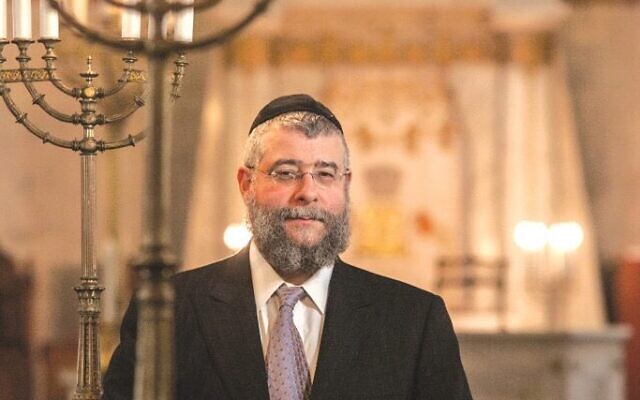Moscow’s former Chief Rabbi: ‘The best option for Russian Jews is to leave’
Pinchas Goldshmidt urges Russian Jews to follow his example and leave before it’s too late.
Pinchas Goldshmidt, the former Chief Rabbi of Moscow who fled the country earlier this year, said other Russian Jews should leave before it’s too late in an interview with the Guardian.
“When we look back over Russian history, whenever the political system was in danger you saw the government trying to redirect the anger and discontent of the masses towards the Jewish community,” Goldschmidt told the Guardian. “We saw this in Tsarist times and at the end of the Stalinist regime.”
He argued that Russia’s floundering invasion of Ukraine is starting to foster a similar environment.
“We’re seeing rising antisemitism while Russia is going back to a new kind of Soviet Union, and step by step the Iron Curtain is coming down again. This is why I believe the best option for Russian Jews is to leave,” Goldschmidt said.
Goldschmidt, who was born in Switzerland but has been serving Russian Jewry since 1989, left the country in June, nearly four months after Russia began its invasion. He said that he was being pressured to support the invasion and feared the impact his refusal might have on Moscow’s Jewish community.
“Pressure was put on community leaders to support the war and I refused to do so. I resigned because to continue as Chief Rabbi of Moscow would be a problem for the community because of the repressive measures taken against dissidents,” he said.
However, others in Russia have denied that claim, including the director of Moscow’s Choral Synagogue which reelected him Chief Rabbi almost immediately after he left.
Other Jewish leaders in Russia have remained in the country, such as Berel Lazar, a rabbi affiliated with the Hasidic Chabad-Lubavitch movement who despite long being seen as close to Putin has spoken out against the war.
But Jews, like Russians of all ethnicities, have been fleeing Russia en masse since the war began in late February. In August, it was estimated that more than 20,000 of Russia’s 165,000 Jews had fled the country.
“There’s a section of Russian society called the creacle, the creative class of business and cultural leaders, intellectuals and artists,” Goldschmidt said, “and I think it’s safe to say a great percentage of those people have left Russia, which is and will be very detrimental to Russian society.”
During the interview with the Guardian, Goldschmidt, who is also the president of the Conference of European rabbis, additionally discussed other issues facing European Jewry, such as rising antisemitism around the world, and how the state of European Jewry compares to the situation for Jews in the United States.
“For many years, Jews in the U.S. believed that it was an exception, that whatever happened in Europe and other countries could never happen there,” Goldschmidt said. “But over the past three years there have been more attacks on Jews there than in Europe.
“What is changing is the political system is much more polarised but also the discourse has been upended by social media. The polarisation we’re seeing has made antisemitism much more acceptable.”
During the interview, Goldschmit also praised Ukraine’s Jewish community, denying Putin’s line that it is Nazi state.
“Show me another country that is in the grip of Nazis where the Jewish community is thriving,” Goldschmidt said.

Thank you for helping to make Jewish News the leading source of news and opinion for the UK Jewish community. Today we're asking for your invaluable help to continue putting our community first in everything we do.
For as little as £5 a month you can help sustain the vital work we do in celebrating and standing up for Jewish life in Britain.
Jewish News holds our community together and keeps us connected. Like a synagogue, it’s where people turn to feel part of something bigger. It also proudly shows the rest of Britain the vibrancy and rich culture of modern Jewish life.
You can make a quick and easy one-off or monthly contribution of £5, £10, £20 or any other sum you’re comfortable with.
100% of your donation will help us continue celebrating our community, in all its dynamic diversity...
Engaging
Being a community platform means so much more than producing a newspaper and website. One of our proudest roles is media partnering with our invaluable charities to amplify the outstanding work they do to help us all.
Celebrating
There’s no shortage of oys in the world but Jewish News takes every opportunity to celebrate the joys too, through projects like Night of Heroes, 40 Under 40 and other compelling countdowns that make the community kvell with pride.
Pioneering
In the first collaboration between media outlets from different faiths, Jewish News worked with British Muslim TV and Church Times to produce a list of young activists leading the way on interfaith understanding.
Campaigning
Royal Mail issued a stamp honouring Holocaust hero Sir Nicholas Winton after a Jewish News campaign attracted more than 100,000 backers. Jewish Newsalso produces special editions of the paper highlighting pressing issues including mental health and Holocaust remembrance.
Easy access
In an age when news is readily accessible, Jewish News provides high-quality content free online and offline, removing any financial barriers to connecting people.
Voice of our community to wider society
The Jewish News team regularly appears on TV, radio and on the pages of the national press to comment on stories about the Jewish community. Easy access to the paper on the streets of London also means Jewish News provides an invaluable window into the community for the country at large.
We hope you agree all this is worth preserving.






















